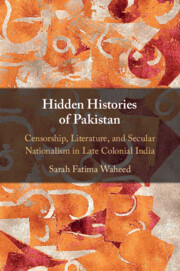2 - Blasphemy
Progressives, Literary Ethics, and the Case of Burning Embers
Published online by Cambridge University Press: 06 January 2022
Summary
The controversy over Angāre in the early 1930s has always been interpreted as a contest between religious and secular forces given the furor around the publication for being “blasphemous.” Turning to relevant legislation in the period, contextualizing debates around blasphemy in the legal and literary spheres, and analyzing responses to the text, I problematize assumptions behind seeing the controversy as one about religion vs. secularism. I argue that the text and the reception to it is best read as a crisis over ethics within the colonized, Urdu-speaking Muslim upper classes of urban North India, who were beginning to stake their raison d’etre and sense of selfhood on minority political status. This status had enormous consequences a decade later in the demand for Pakistan. This chapter shows how this early controversy was about how a class of Indian Muslims were identifying as an ethical community, not a religious one.
- Type
- Chapter
- Information
- Hidden Histories of PakistanCensorship, Literature, and Secular Nationalism in Late Colonial India, pp. 44 - 93Publisher: Cambridge University PressPrint publication year: 2022

